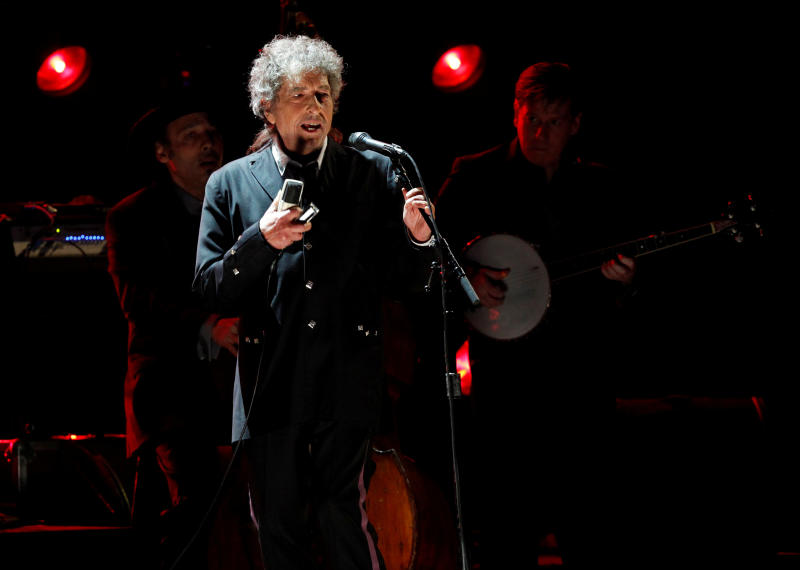The love songs they are a-changing: Bob Dylan records She's Funny That Way as He's Funny That Way
Sign up now: Get ST's newsletters delivered to your inbox

As part of a new EP called Universal Love, Bob Dylan rerecorded the 1929 song She's Funny That Way, but switched the pronoun to He's Funny That Way.
PHOTO: REUTERS
(NYTimes) - Shortly after the Supreme Court legalised same-sex marriage in 2015, Justice Antonin Scalia attended a party where he signalled his displeasure by singing Bob Dylan's The Times They Are a-Changin'. "He sang with great verve," Justice Ruth Bader Ginsburg told The Washington Post at the time.
Now Dylan himself is crooning about same-sex love. As part of a new EP called Universal Love, he rerecorded the 1929 song She's Funny That Way, from the Great American Songbook catalogue, but switched the pronoun to He's Funny That Way. The six-track set, to be released on Friday, also features Kesha, St. Vincent and other noted musicians covering well-known pop hits with a same-sex twist. The performers represent a mix of gay and straight artists.
"If you look at the history of pop music, love songs have predominantly come from one heterosexual perspective," said Tom Murphy, a co-producer of Universal Love. "If we view music as something that brings people together, shouldn't these popular songs be open to everyone?"
The album was funded by MGM Resorts International, and its songs are intended to function as wedding anthems for same-sex couples. Gay weddings account for 20 percent to 30 percent of the ceremonies performed at the company's 15 hotels in Las Vegas, said Jim Murren, its chief executive.
To secure the right to perform the songs with altered lyrics, permission was required from the songs' publishers. "The response was completely positive," said Rob Kaplan, the project's executive producer.
Kaplan started his search for artists with Ben Gibbard, frontman for Death Cab for Cutie, an alternative rock band from Washington state. Gibbard had expressed his support of marriage equality in a 2012 essay for The Daily Beast, inspired by his sister, a lesbian. "This was a cause at our family dinner table," Gibbard said.
For the project, Gibbard elected to recast the Beatles classic And I Love Her to And I Love Him. "It's a song my dad often played to my mom after dinner," he said. "Also, it's a song everyone knows."
Kesha chose Janis Joplin's I Need A Man To Love ("such a gritty, soulful song," Kesha said), and changed it to I Need A Woman To Love. "For years, I said that I'm not getting married until any two people can legally marry in this country," Kesha said. She has since become ordained and has performed weddings for two gay couples.
Valerie June, a country and blues singer who attended her first gay marriage last year for her cousin, recorded a big-band version of Mad About The Boy, changing "boy" to "girl". June believes it adds an extra layer of meaning that the song's writer, Noel Coward, was gay and that the version he recorded in 1932 wasn't released in its day because of prevailing homophobia.
"It brings the song full circle to know that it was written by a gay man who meant every single word of Mad About the Boy," she said.
Dylan, who does not appear to have spoken out in favour of gay rights in the past, declined to be interviewed. But his choice of song, She's Funny That Way, which has been recorded by Frank Sinatra and Nat King Cole, gains a wink in its current guise; He's Funny That Way can also be read as an antiquated code for a gay person.
Dylan's warm and wry performance captures the mix of wit and sincerity favoured by songs from the American standards era.
Kaplan said that when he contacted Dylan, he got a very quick yes. "And it wasn't just 'yes, I'll do this,'" he said. "It was 'hey, I have an idea for a song.'"
Universal Love arrives at an evolving time for same-sex pronouns in pop. Though major music stars started to come out in significant numbers in the 1990s, with artists including K.D. Lang, Melissa Etheridge and Elton John, rarely, if ever, did they use same-sex pronouns in their recordings.
Only in the last six years have younger stars slowly begun to do so, including Frank Ocean, Olly Alexander and Mary Lambert, who crooned the chorus of Macklemore and Ryan Lewis's Grammy-nominated Same Love in 2012.
"For a long time, queer people had to use the awkward 'you' in their songs to avoid outing themselves," said Stephan Pennington, a professor of music at Tufts University who teaches a course in "queer pop." "There has also always been pressure from the record companies to not be exclusionary by using a same-sex pronoun," Pennington said. "But heterosexual expressions are never thought of as exclusionary."
Indeed, Sam Smith, arguably the most prominent gay pop star today, refrains from using same-sex pronouns.


